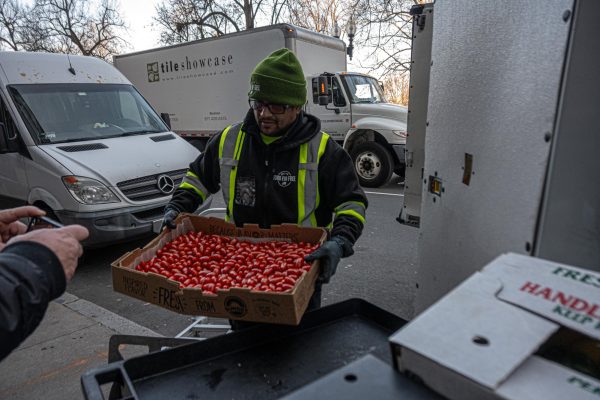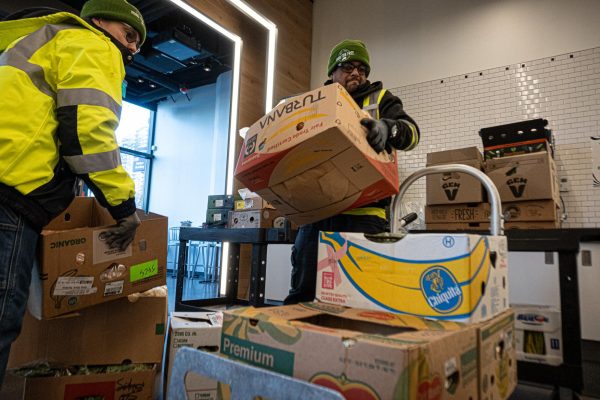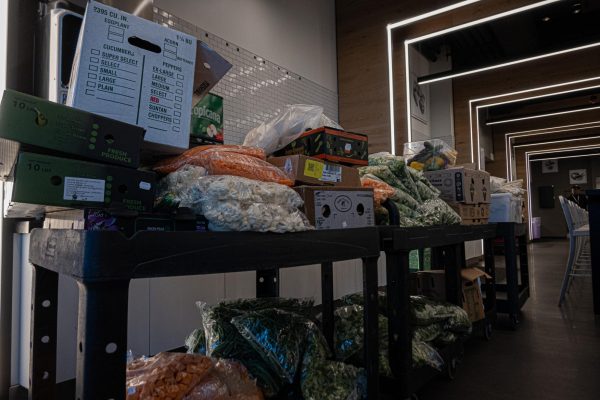Emerson students finishing their meal in the dining hall often throw the remains of their scraps into the compost bin, but where do the seemingly endless pans of uneaten food go? Enter: Food For Free.
On the morning of Dec. 18, after residential halls closed for winter break, Food For Free and Emerson Dining Services conducted a large-scale end-of-semester pick-up where roughly 350 pounds of fresh produce and pre-cooked meats were boxed up to be donated. 
‚ÄúIt’s great to give during the holiday season, but I think it’s important to give all year round,‚ÄĚ Dawn Sajdyk, district manager of Bon Appetit and a driving force behind the partnership, said. ‚ÄúBon Appetit and Emerson College share the same values when it comes to food insecurity, and being able to give back to the community.‚ÄĚ
Every Tuesday, the nonprofit picks up untouched food from Emerson’s dining hall and takes it to a Cambridge warehouse where it can be repurposed into healthy, single-serve meals sent to locations in East Boston and Somerville to feed members of the community in need. 
Emerson’s partnership with Food for Free started roughly five years ago after the Bon Appetit Management Company began to oversee Emerson College Dining. Sajdyk manages any significant changes to the dining options on campus, and said an amount of food as large as the one the college donated at the end of the fall makes the pick-up an important event, but should be a reminder of the importance of giving back.
On top of giving back to the people of Boston, the college ‚Äúalso tries to keep food out of the waste stream.‚ÄĚ To accomplish this, Emerson is one of many schools that have partnered with the organization to combat food insecurity.

‚Äú[We] take recovered food that is prepared and frozen on-site, and then we take it to our production kitchen in Cambridge and create single-serve frozen meals,‚ÄĚ Molly Hansen, the senior program manager at Food for Free who runs the service called Heat-N-Eats, said. ‚ÄúThen these frozen meals are distributed all over Boston, mainly to adult education centers and community colleges.‚ÄĚ
Hansen also noted food that can’t be turned into an entire meal, like produce, would still be distributed to the Elizabeth Peabody House in Somerville and the East Boston Harborside Community School.
The Heat-N-Eats process has a less than three-week turnaround from the food being donated, made into meals, and then distributed. Hansen and her team were especially grateful for Emerson’s end-of-semester donation because it was a large and fresh supply of food.
‚ÄúOne in three adults in Massachusetts struggle with food insecurity; it’s really important that we’re doing everything we can to really bridge the gap of waste and getting that [food] to the people who are in need,‚ÄĚ Hansen said. ‚ÄúEspecially around the holidays, food is a big part of community and gatherings.‚ÄĚ

Emerson’s Associate Director of Sustainability Jennifer Lamy affirmed the importance of the college’s relationship with Food for Free and said the college will compost anything the organization can’t take.
‚ÄúThis program is great because every week we’re taking food that otherwise would have gone to waste and giving it to someone else instead of having to divert it,‚ÄĚ said Lamy. ‚ÄúWe try to reduce before we think about actually throwing something out no matter what bin it goes in.‚ÄĚ
Figuring out how much food Emerson has in surplus each week is no easy task. Alex Drumm, Emerson’s executive chef through Bon Appetit, has been calculating food waste on campus since 2019. On top of managing staff, placing food orders, and creating production plans to calculate how much food needs to be prepared each day, Drumm’s planning takes into account students’ eating habits, including analyzing food consumption upon returning from breaks and keeping track of how the weather affect’s students’ eating habits. 
‚ÄúUnderstanding those trends becomes kind of like a juggling act,‚ÄĚ Drumm said. ‚ÄúFor one, we have to ensure that all the students are nourished, but also be financially responsible with not overproducing.‚ÄĚ
Drumm and his team also track every item that comes out of each oven, the exact temperature of the food, and how much food was eaten to inform consumption trends.  
‚ÄúOur job is to ensure that we have enough for everyone that comes through the door, so I’m lucky that we have a talented group that really cares about their jobs,‚ÄĚ Drumm said.
Drumm is grateful for Emerson’s relationship with Food For Free and says seeing where the food goes and how many people are affected by the program has changed his outlook on waste.   
‚ÄúJust seeing where the food goes and who it helps and how many people are affected by it, it definitely changes your outlook on waste and just being a part of the community,‚ÄĚ Drumm said.
That perspective on waste is something Drumm wants his entire dining staff to be mindful of. 
‚ÄúOne of the things I try to pride myself on is the dining staff being a part of the Emerson community, not just being in a service,‚ÄĚ Drumm said. ‚ÄúPartnering with Food for Free is something that’s in my value system.‚ÄĚ
